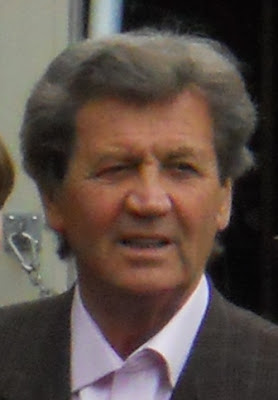"What's in a name? That which we call a rose by any other name would smell as sweet."
- William Shakespeare's "Romeo and Juliet" (1597), Act II, Scene ii
I did not like most of my English classes growing up. This is ironic, considering I wanted to be a fiction writer, but with the notable exception of seventh grade (and English 101 in college), I found my English classes less than inspiring. So it might have come as a surprise to me that I would one day enjoy a documentary about the history of the English language. But enjoy it I did, and I felt inspired to write a post about it here.
I was interested in history in my youth, but English was mostly just a boring set of classes that I had to pass in order to graduate. The grammar and vocabulary were easy enough to make me yawn, the literature tended to be boring, the writing assignments were ridiculously easy, and the practical applications were so few and far between that I started to wonder why we had to take this useless subject. But I was fascinated by foreign languages, and I enjoyed the French classes that I took in high school. To me, they were a lot more interesting than English.
But you may be thinking: why do I mention foreign languages in a post about English? Because like most languages of the world, English has been greatly influenced by other languages. English is a Germanic tongue, and what we today call "Old English" is actually quite similar to modern German and Dutch. It was greatly influenced by contact with Old Norse (the language of the invading Vikings, similar to modern Danish), and then by the French of the Norman conquerors. Throughout the history of English, the language has also borrowed numerous words from Latin (from science and from religion), and there is also some significant influence from Ancient Greek. And on a smaller scale, English has borrowed from practically every other language that it came into contact with. Through trade and war, English has absorbed words from numerous other tongues.
William Shakespeare
The history of the English language is also greatly influenced by literature, from Beowulf and Chaucer to Shakespeare and the King James Bible. The literature is not something that interests me much, but its effect on the history of the language was surprisingly interesting when well-told by British presenter Melvyn Bragg. It was he that made this six-hour documentary "The Adventure of English," about the history of the English language. When I heard his engaging presentation about the story of my mother tongue, I found it surprisingly fascinating. This is one of the few series I've ever seen made about linguistics. Learning about the history of English was my first real contact with the subject, and since first viewing this documentary, I've read an introductory textbook about linguistics to scratch the itch in my brain. (What can I say? I'm a language nerd.)
Melvyn Bragg
I may not read too many more hard textbooks about linguistics, as they are a lot of work; but I will continue my attempts to become fluent in some foreign languages - and of course, I will revisit this series time and time again. The history of the English language really is an adventure, of colonization and political conflict. Its story can be dramatic and comedic, refined and raw; and if you're interested in learning about it, you could do worse than to watch this fascinating series.
DVD at Amazon
See also Wikipedia's episode descriptions
Disclosure: I am an Amazon affiliate marketer, and can sometimes make money when you buy the product using the link(s) above.
If you liked this post, you might also like:
“The English Lesson” (a clever poem about English grammar)
A review of Robert McCrum's “The Story of English” (book)
Reflections on studying the history of languages
A review of Michael Wood’s “In Search of Shakespeare”
The unknown story behind the King James version of the Bible
Reflections on learning about Spanish linguistics
A review of Rafael Lapesa's “Historia de la lengua española”
A review of PBS’s “Breaking the Maya Code”
Part of a series about
Modern languages
A review of Melvyn Bragg’s “The Adventure of English”
Note: These posts do not have to be read in any particular order. Since time periods overlap, there isn’t much chronological order to observe here.
See also this series about
My own experiences
Note: These posts do not have to be read in any particular order. Since time periods overlap, there isn’t much chronological order to observe here.
Available on YouTube
(see first episode below)







Hey thanks! that was helpful! my daughter is studying linguistics and I forwarded her the link.
ReplyDelete